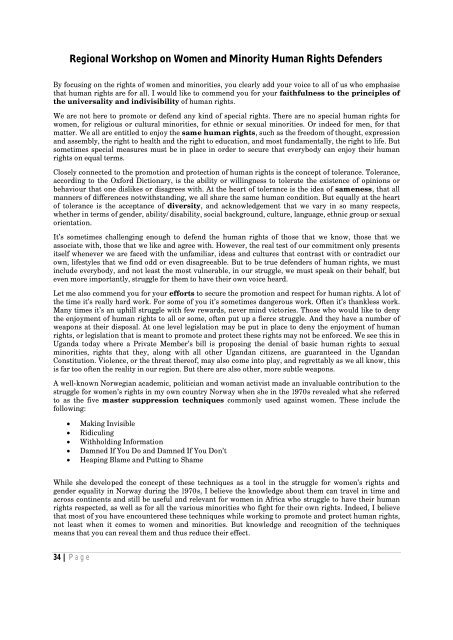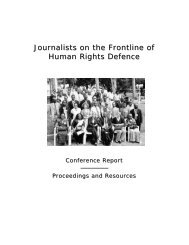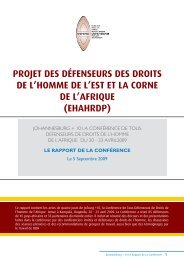Table of Contents - East and Horn of Africa Human Rights ...
Table of Contents - East and Horn of Africa Human Rights ...
Table of Contents - East and Horn of Africa Human Rights ...
Create successful ePaper yourself
Turn your PDF publications into a flip-book with our unique Google optimized e-Paper software.
Regional Workshop on Women <strong>and</strong> Minority <strong>Human</strong> <strong>Rights</strong> Defenders<br />
By focusing on the rights <strong>of</strong> women <strong>and</strong> minorities, you clearly add your voice to all <strong>of</strong> us who emphasise<br />
that human rights are for all. I would like to commend you for your faithfulness to the principles <strong>of</strong><br />
the universality <strong>and</strong> indivisibility <strong>of</strong> human rights.<br />
We are not here to promote or defend any kind <strong>of</strong> special rights. There are no special human rights for<br />
women, for religious or cultural minorities, for ethnic or sexual minorities. Or indeed for men, for that<br />
matter. We all are entitled to enjoy the same human rights, such as the freedom <strong>of</strong> thought, expression<br />
<strong>and</strong> assembly, the right to health <strong>and</strong> the right to education, <strong>and</strong> most fundamentally, the right to life. But<br />
sometimes special measures must be in place in order to secure that everybody can enjoy their human<br />
rights on equal terms.<br />
Closely connected to the promotion <strong>and</strong> protection <strong>of</strong> human rights is the concept <strong>of</strong> tolerance. Tolerance,<br />
according to the Oxford Dictionary, is the ability or willingness to tolerate the existence <strong>of</strong> opinions or<br />
behaviour that one dislikes or disagrees with. At the heart <strong>of</strong> tolerance is the idea <strong>of</strong> sameness, that all<br />
manners <strong>of</strong> differences notwithst<strong>and</strong>ing, we all share the same human condition. But equally at the heart<br />
<strong>of</strong> tolerance is the acceptance <strong>of</strong> diversity, <strong>and</strong> acknowledgement that we vary in so many respects,<br />
whether in terms <strong>of</strong> gender, ability/disability, social background, culture, language, ethnic group or sexual<br />
orientation.<br />
It’s sometimes challenging enough to defend the human rights <strong>of</strong> those that we know, those that we<br />
associate with, those that we like <strong>and</strong> agree with. However, the real test <strong>of</strong> our commitment only presents<br />
itself whenever we are faced with the unfamiliar, ideas <strong>and</strong> cultures that contrast with or contradict our<br />
own, lifestyles that we find odd or even disagreeable. But to be true defenders <strong>of</strong> human rights, we must<br />
include everybody, <strong>and</strong> not least the most vulnerable, in our struggle, we must speak on their behalf, but<br />
even more importantly, struggle for them to have their own voice heard.<br />
Let me also commend you for your efforts to secure the promotion <strong>and</strong> respect for human rights. A lot <strong>of</strong><br />
the time it’s really hard work. For some <strong>of</strong> you it’s sometimes dangerous work. Often it’s thankless work.<br />
Many times it’s an uphill struggle with few rewards, never mind victories. Those who would like to deny<br />
the enjoyment <strong>of</strong> human rights to all or some, <strong>of</strong>ten put up a fierce struggle. And they have a number <strong>of</strong><br />
weapons at their disposal. At one level legislation may be put in place to deny the enjoyment <strong>of</strong> human<br />
rights, or legislation that is meant to promote <strong>and</strong> protect these rights may not be enforced. We see this in<br />
Ug<strong>and</strong>a today where a Private Member’s bill is proposing the denial <strong>of</strong> basic human rights to sexual<br />
minorities, rights that they, along with all other Ug<strong>and</strong>an citizens, are guaranteed in the Ug<strong>and</strong>an<br />
Constitution. Violence, or the threat there<strong>of</strong>, may also come into play, <strong>and</strong> regrettably as we all know, this<br />
is far too <strong>of</strong>ten the reality in our region. But there are also other, more subtle weapons.<br />
A well-known Norwegian academic, politician <strong>and</strong> woman activist made an invaluable contribution to the<br />
struggle for women’s rights in my own country Norway when she in the 1970s revealed what she referred<br />
to as the five master suppression techniques commonly used against women. These include the<br />
following:<br />
� Making Invisible<br />
� Ridiculing<br />
� Withholding Information<br />
� Damned If You Do <strong>and</strong> Damned If You Don’t<br />
� Heaping Blame <strong>and</strong> Putting to Shame<br />
While she developed the concept <strong>of</strong> these techniques as a tool in the struggle for women’s rights <strong>and</strong><br />
gender equality in Norway during the 1970s, I believe the knowledge about them can travel in time <strong>and</strong><br />
across continents <strong>and</strong> still be useful <strong>and</strong> relevant for women in <strong>Africa</strong> who struggle to have their human<br />
rights respected, as well as for all the various minorities who fight for their own rights. Indeed, I believe<br />
that most <strong>of</strong> you have encountered these techniques while working to promote <strong>and</strong> protect human rights,<br />
not least when it comes to women <strong>and</strong> minorities. But knowledge <strong>and</strong> recognition <strong>of</strong> the techniques<br />
means that you can reveal them <strong>and</strong> thus reduce their effect.<br />
34 | P a g e








